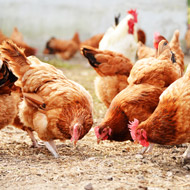New welfare codes for laying hens welcomed

The code encourages owners and keepers to use local and national sources of disease surveillance.
Veterinary organisations have welcomed a new welfare code for laying hens, which was laid before parliament this week (5 June).
The new Code of Practice for the Welfare of Laying Hens and Pullets is one of a series of welfare codes being reviewed and updated by Defra.
It has been welcomed by the BVA, British Veterinary Poultry Association and the Veterinary Public Health Association.
BVA president John Fishwick said the association is “delighted” to see the benefit of veterinary surveillance systems highlighted. The code encourages owners and keepers to use local and national sources of disease surveillance to improve their understanding of poultry disease patterns and the “local health and welfare landscape”.
He added: “We are also pleased to see signposting within the Code of Practice to the Humane Slaughter Association’s Code of Practice for the Disposal of Chicks in Hatcheries, which outlines in detail information about humane methods of killing and good practice.
“The British poultry industry has some of the highest welfare standards in the world and the veterinary profession is fully committed to working with Defra on further enhancing animal welfare codes to reflect best industry practice.”



 The Animal and Plant Health Agency (APHA) has updated its online reporting service for dead wild birds.
The Animal and Plant Health Agency (APHA) has updated its online reporting service for dead wild birds.